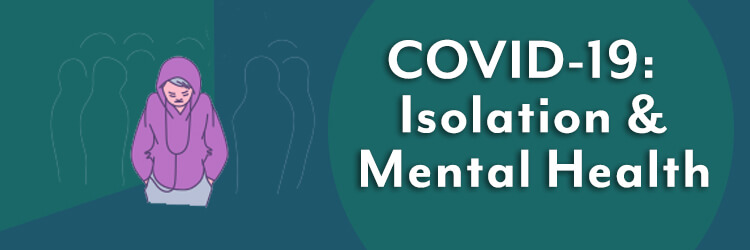[vc_row][vc_column][vc_column_text]I’ve written on this blog about isolation and recovery. It’s been said that connection is the opposite of addiction. But how does isolation affect overall mental health? The answer is significantly—especially after prolonged periods. Most of us have had limited in-person contact for months now. It’s important that we stay connected in other ways.
According to an article in the Journal of Clinical Nursing, longer quarantine time is associated with increased PTSD. The authors of the study concluded that quarantine itself may be a traumatic event. This is unfortunate, as most situations that require quarantine are highly stressful in and of themselves.
Social isolation can exacerbate Anxiety and Depression. In one study consisting of interviews with hundreds of people in solitary confinement, a third were “actively psychotic and acutely suicidal.” The study found that people in confinement are prone to panic attacks, hallucinations, paranoia, and difficulty thinking.
In another study, where graduate students were paid to stay in a small room and only leave to use the bathroom, nearly all participants lost the ability to think clearly on any subject. And this was only for seven days or less; the study was supposed to last six months, but no participants made it longer than a week.
Isolation has also been shown in numerous studies to affect physical health. A 2015 study found that in lonely people, leukocytes—white blood cells integral to the immune system’s response to infection—showed increased inflammation and decreased antiviral response. Of course, as we continue to face the threat of COVID-19, we need to have a strong viral response.
But loneliness is not the same as isolation. One can be lonely surrounded by people or connected while alone in their house. That second part is key. Many of us have access to multiple video conferencing applications, messaging apps, and social media platforms. It’s possible to stay connected to other humans all day long, even if you are not physically with them.
If you know someone who doesn’t have Internet access—especially if they struggle with their mental health—check in on them often. We can meet outside (staying six feet apart, with masks if possible). This is another great option that requires no technology.
After months of only seeing people besides my partner on screens, I have done multiple outdoor social distance hangouts. The in-person connection boosts my spirit more than anything I’ve done in the past few months. If you don’t have Internet access but have a phone, a call can be just as enriching.
Depending on your circumstances, neighbors are another great resource for human connection. Knowing most people couldn’t gather in groups for Memorial Day here in Baltimore—which is still on a stay-at-home order—my block did a socially distant talent show. The road was the stage, and the audience watched from their porches or the sidewalk.
Even if you are not close enough with your neighbors to plan socially distanced activities, you can make a point to say hi or wave to your neighbors when you see them outside. This sounds small, but gestures like this add up and can make you feel less isolated from the world.
There are also often neighborhood groups on platforms like Facebook where you can organize group activities. This weekend, some people in my neighborhood did a social distance gathering to weed the area by our neighborhood sign. Participating in community activities is a way to be of service and stay connected.
During this time when there is a lot of (useful) information about keeping your body safe, remember also to protect your mind. Your mental health is equally important. And human connection is a crucial human need.
If you are struggling with a substance use or mental health disorder during the COVID-19 crisis, there is hope. TruHealing Centers is open throughout the pandemic, with hospital-grade sanitization and telehealth options, so that you can feel safe receiving treatment. At our facilities across the country, we will connect you to support systems and help you thrive in long-term recovery. Call an admissions specialist at 410-593-0005.[/vc_column_text][/vc_column][/vc_row]









